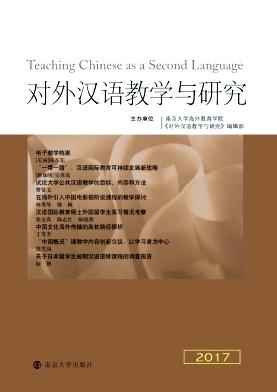The Ideal Foreign Oriented Definition Model of Words with Chinese Characteristics
引用次数: 0
Abstract
The rapidly growing number of Chinese learners around the world requires us to seek for a more effective definition of Words with Chinese Characteristics (WCCs), which refers to the category of words that bear characteristics of Chinese ethic, life context, natural environment, customs and, religious belief, etc. They reflect the accumulation of Chinese culture. Learning Chinese language is inseparably associated with acquiring certain Chinese culture knowledge. As what Humboldt said, a nation’s language is a nation’s spirit (??? 2005). This study aims at constructing a model for satisfactorily analyzing WCCs from foreigners’ perspective as an important preparing procedure for defining them in the foreign-oriented learning dictionaries. Based on the Ideal Cognitive Model (ICM), the means of structures by which people constantly organize their knowledge (Lakoff 1987: 85), a new model will be effective in describing the WCCs within a theoretical framework connecting language, cognition, and culture. Practically, this study provides samples of defining WCCs and sets up a model of defining them for foreign-oriented dictionaries, helpful for Chinese language learning as SLA. Theoretically, the analysis of these words offers an approach to bringing deeper insight into Chinese language and to appropriately interpreting more culture-loaded words. Furthermore, this study proves the feasibility and advantage of application of cognitive linguistic theories in construing and interpreting language.面向外国的汉语特色词汇理想定义模式
随着世界范围内汉语学习者数量的迅速增长,我们需要寻找一个更有效的中国特色词汇的定义,即具有中国伦理、生活语境、自然环境、风俗习惯、宗教信仰等特征的一类词汇。它们反映了中国文化的积淀。学习汉语与获得一定的中国文化知识是密不可分的。正如洪堡所说,一个民族的语言就是一个民族的精神。2005). 本研究旨在构建一个能从外国人的角度满意地分析汉语词汇的模型,作为外语学习词典对汉语词汇进行定义的重要准备程序。基于理想认知模型(ICM),即人们不断组织知识的结构手段(Lakoff 1987: 85),一个新的模型将在连接语言、认知和文化的理论框架内有效地描述世界认知模型。在实践中,本研究提供了定义语义语义的样本,并建立了面向外文词典的语义语义定义模型,有助于汉语二语习得。从理论上讲,对这些词汇的分析提供了一种更深入地了解汉语的途径,并有助于正确地解释更多的文化负载词。进一步证明了认知语言学理论在语言建构和口译中的可行性和优势。
本文章由计算机程序翻译,如有差异,请以英文原文为准。
求助全文
约1分钟内获得全文
求助全文

 求助内容:
求助内容: 应助结果提醒方式:
应助结果提醒方式:


